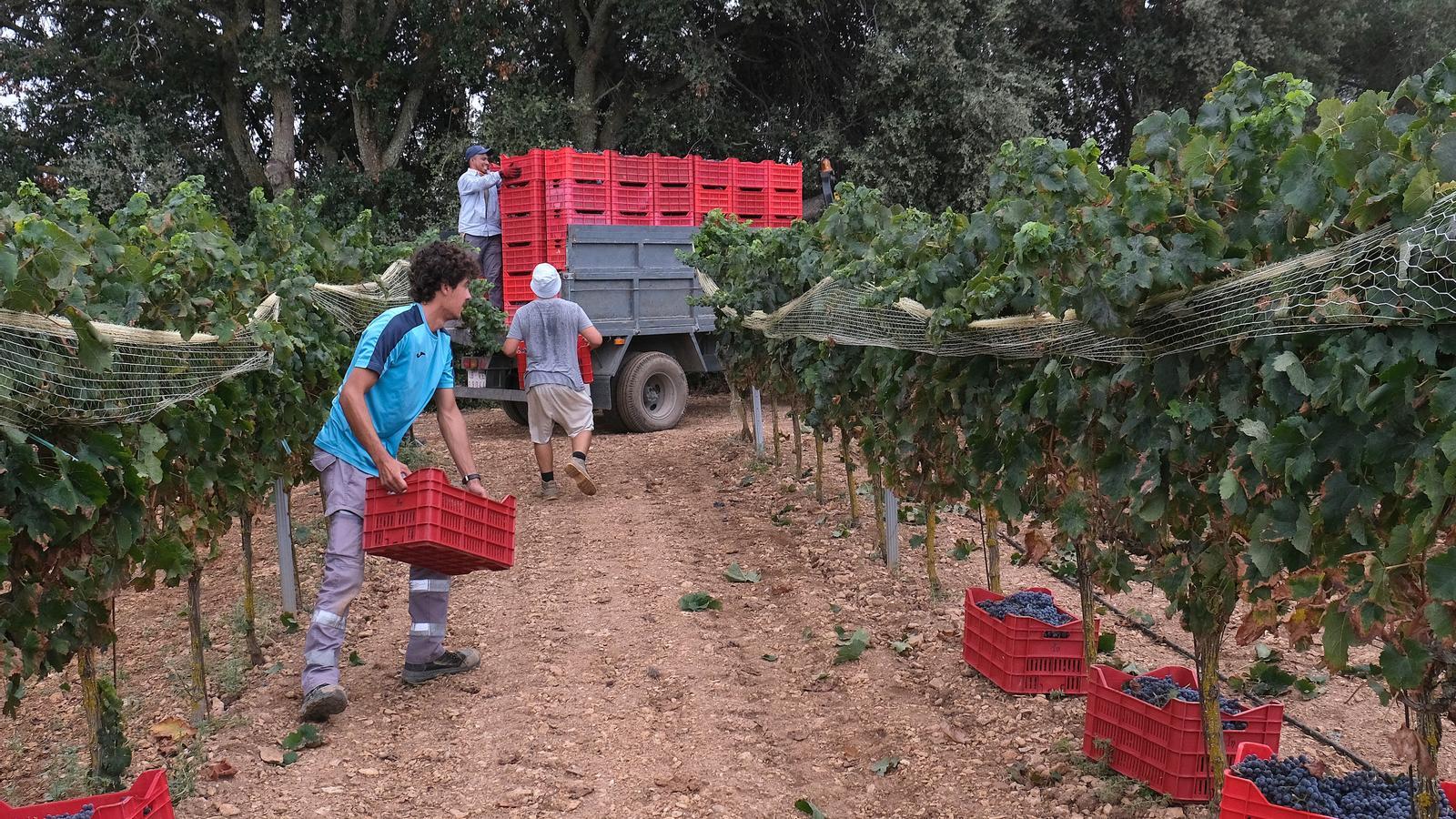A young farmer's grape harvest day: "There's no labor, so we help each other."
Winemaker Jaume Forteza champions the work of grape harvesting, despite being marked by heat, lack of water, and lack of generational relevance.


PalmAt seven in the morning, in a vineyard in Felanitx, the frozen water jugs on a dry wall are already dripping. They're covered with workers' T-shirts to keep out the little bit of sun that's just beginning to rise. From between the rows of vineyards, cheerful but soft music can be heard, as well as some conversation. However, the predominant sounds are the shears used for pruning and the scraping of plastic crates on the ground. The day before pruning, they are left on the farm, placed between the subtle, linear furrows in each row of vines to save themselves some work the next day.
Right in the middle of the fourth row of the vineyard stands Jaume Forteza, a 26-year-old viticulture farmer from Felanitx. Harvesting the old-fashioned way: with a small, light-colored wooden fork. "Now I've been inspired to use it. I think this tool shouldn't be lost. Enough is lost," he believes. He himself is responsible for sowing, maintaining, and tilling some of the farms in the area; some of them his own and others he knows. He never gets a break. "Any day and any time is good for me to till," he says. Throughout the workday, his colleagues call him to arrange which day they should work. He even works on holidays. "Take a rest," his mother calls him from the other side of the row when she hears him say he'll till on a holiday.
As a child, he already knew he wanted to work in the vineyard, and specifically in the vineyard sector, like his godparents. He believes that, given the impact of climate change on the islands, "we have to find a profitable crop." "For now, I'm doing well. But I'm not making a fortune," he emphasizes. In fact, there are days when he works without pay. "There's no labor, so we help each other out in the neighborhood. I go to their farms, and they come to mine. Finding people who want to work in the vineyard is complicated because you don't have a fixed eight-hour day. One day you work three; the next, only two. This doesn't help at all," he explains.
"We gain fatigue."
Nor do his father, mother, and brother, who help him vine harvest under the beating August sun, earn anything. "All we gain is exhaustion," his mother jokes. "But if we don't do it for him, who should we do it for?" she adds, looking proudly at Forteza. A couple of rows further on, there are paid workers from the winery that buys the grapes. Many of them are dressed in long-sleeved shirts and long pants so as not to get any worse than they already are, as one of the employees explains.
The vineyard is no stranger to the heat endured by the vine harvesters, nor to the lack of water suffered by the fields. "The vineyards are in a dry season. We don't irrigate, and they have to survive on rainwater. It's true that if the vineyard is somewhat stressed, it has better quality, but there comes a time when it's no longer good for it. This was previously unthinkable. Winegrowers have seen how water was in excess all their lives," he explains.
Furthermore, this situation has worsened this year with downy mildew—a fungus that dries out grapes—and the green fruit fly, which feeds on vine sap. All of this will mean that 2025 production will be lower than in other years. In fact, last year in the Balearic Islands, quality wine production in 2024 fell by 22% compared to 2023, according to data from the Ministry of Agriculture, Fisheries and the Natural Environment. "And this year it will drop even further," Forteza predicts. Despite this, he clarifies that the price of grapes has not changed: it remains between 90 cents and 1.30 euros per kilo.
This drop in production contrasts with the 2.8% increase in vineyard area in the Islands compared to 2023. The sector has grown significantly in the last decade, partly thanks to foreign investment. Between 2010 and 2020, 40 wineries were registered with the Islands' designations of origin. And in retrospect, there were only fifteen 30 years ago, according to industry sources.
This trend has meant that, in areas primarily used for agricultural activity, there is less space for farmers and more for leisure activities or activities linked to real estate speculation. "And all the grapes the speculators produce are grapes we can't sell," complains Forteza.
After finishing the fourth row, Forteza decides it's time to load the crates full of Merlot onto the trailer to take them to the winery. To move the tractor between the narrow ditches, he has to perform a precision exercise to avoid stepping on any vines. The workers who collect the crates and pass them to their partner on the trailer often use their T-shirts to wipe the sweat from their faces.
Forteza acknowledges that in the primary sector, "everything is a problem," but believes that continuing to work in it requires even more training. "There's no other way out," he concludes.
